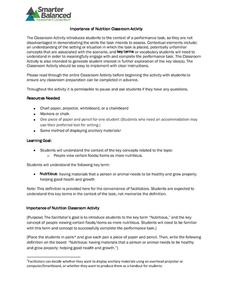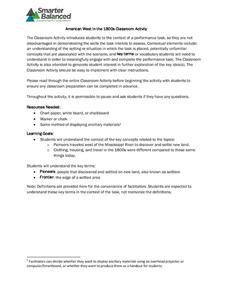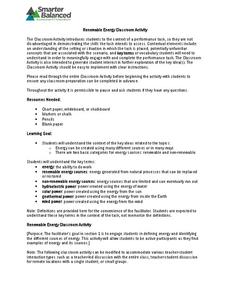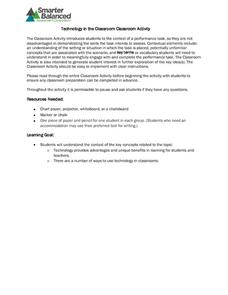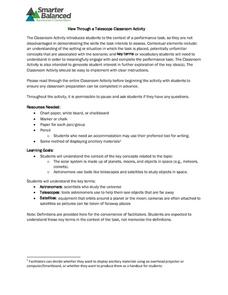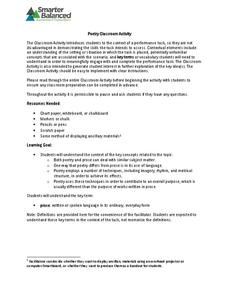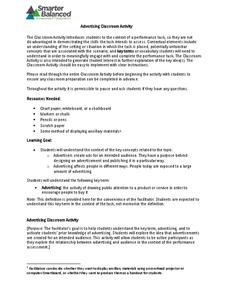Smarter Balanced
Effects of Water
To prepare for a performance task assessment, class members review the stages of the water cycle and then individuals assume the roles of drops of water for a Reader's Theater exercise. The script, a graphic depicting the water...
Smarter Balanced
Importance of Nutrition
Prepare your class members for the performance task assessment on nutrition with an activity that asks class members to rank images of foods from least nutritious to most. Participants also offer reasons for why they ranked the...
Smarter Balanced
How We Learn
What's the best way to learn the elements of the periodic table? The inventions of Thomas Edison? Patience? To prepare for the performance task assessment on how people learn, class members share ideas about ways to learn in a variety of...
Smarter Balanced
How the Brain Works
Cerebrum, cerebellum, brainstem, pituitary gland, and spinal cord. Prepare your class for a performance task assessment on the brain and how it works with a scripted plan that defines these terms and identifies the functions the...
Smarter Balanced
Food Waste and Food Access
Forty percent of food in the US goes uneaten while 14.5 percent of US households lack a secure supply of food. As part of the preparation for a performance task assessment, groups consider statistics such as these about food waste and...
Smarter Balanced
Exploring the World
To prepare for the Exploring the World Performance Task, class groups generate a list of places they would like to explore, examine images of seven natural wonders of the world, and consider why these sites are wondrous. A map and images...
Smarter Balanced
Communicable Diseases
Pathogens, what they are, how they spread, and how to prevent them from spreading are the focus of this resource that can be used to prepare learners for a performance task assessment or to begin the study of communicable diseases.
Smarter Balanced
Classifying Vertebrates
What features do scientists use to classify animals into groups? Class groups examine a series of paired images of vertebrates (a bass and a trout, a toad and a newt, a crocodile and a tortoise, an owl and a robin, a tiger and a bear)...
Smarter Balanced
Thunderstorms
Ensure that all class members understand the basic concepts and vocabulary they need to complete a performance task on thunderstorms with an activity that asks them to use a Venn diagram to compare thunderstorms with rainy days.
Smarter Balanced
Zoos
How do the experiences of animals living in zoos differ from animals living in the wild? To prepare for a performance assessment on this question, class members are introduced to key concepts and vocabulary, and then groups use a Venn...
Smarter Balanced
Monuments (and Landmarks)
Distinguishing between and understanding the purpose of landmarks and monuments is the focus a short activity designed to provide all learners with the context of a performance task. Images of the Martin Luther King Jr. Memorial, the...
Smarter Balanced
American West in the 1800s
To establish a context for an assessment or a study of pioneers and the American frontier in the 1800s, groups examine photos and record observations about clothing, housing, and travel.
Smarter Balanced
Renewable Energy
Renewable and non-renewable energy sources are the focus of a series of activities that prepare learners for a performance task assessment on energy. Groups identify the various sources of energy and classify these sources as either...
Smarter Balanced
The Internet
The Internet and how it has changed our lives is the focus of a series of activities that prepares learners for the performance task assessment on the influence of the Internet. Groups also brainstorm devices such as phone and cars that...
Smarter Balanced
Growth and Expansion of America
Despite the difficulty of travel, the US expanded significantly between the 1800s and the early 1900s. To prepare for a performance task assessment on the rapid expansion of the US in the 1800s, class members engage in a...
Smarter Balanced
Technology in the Classroom
To prepare for a formative assessment on the benefits of technology in the classroom, groups generate a list of the types of technology that could be used in a classroom and then discuss how each of these items could be used. Group...
Smarter Balanced
Environmental Interdependence (Environmental Awareness)
Whether introducing a study of environment awareness or preparing your classes for a performance task related to environmental interdependence, you will find this resource useful. Key terms and concepts are introduced so that all...
Smarter Balanced
Uncommon Animals
Need to prepare for a performance task assessment on the topic of uncommon animals? Here's an activity that ensures all learners have the knowledge of key terms and concepts to approach the assessment.
Smarter Balanced
View Through a Telescope
Preparing for an assessment? Here's an activity that will ensure that all class members have the background knowledge they need to demonstrate their skills on a performance task related to the solar system and the tools astronomers use...
Smarter Balanced
Poetry
How does poetry differ from other forms of writing? Class members view two writing samples, decide which one is a poem, and then identify the criteria they used to distinguish between the two samples.
Smarter Balanced
Advertising
The activities in this packet are designed to ensure that all class members have the necessary background knowledge to successfully engage in an assessment of advertisement appeals. After examining a series of ads, individuals use the...
Smarter Balanced
Intellectual Property
To prepare for a study of intellectual property rights, (or an assessment) introduce your learners to the legal concepts and key vocabulary associated with the debate. After defining intellectual property, copyright, fair use, and...
Smarter Balanced
Aztec Empire
To set the stage for a study of the Aztec Empire, groups use the provided definition of civilization and generate a list of elements that make up our modern day civilization. The whole class then examines an image of an Aztec city and...
Smarter Balanced
Archaeological Discoveries
Artifacts, inscriptions, and monuments. Here's an activity designed to ensure that all learners are familiar with the key terms and concepts they will need to begin a study of archaeological discoveries.



